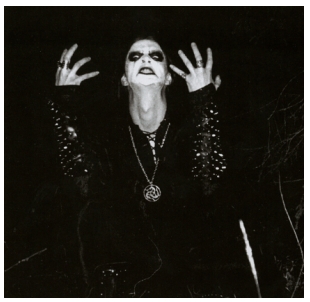As I've mentioned before, I'm not all that obsessive over metal, heavy or otherwise. Don't hate it -- in fact, I like the beat and the aggression and the flights into epic, audio assault -- it just doesn't take priority when I'm programming my Pandora stations. Nevertheless, I'm happy when one year brings us two very good docs about the genre. However, one of the big differences between the earlier Anvil: The Story of Anvil and this month's Until the Light Takes Us is that Anvil's brand of party-hardy, American (Canadian, if you will) metal doesn't quite grab me as much as the darker, more adventurous black metal bands of Until the Light Takes Us.
 Another difference is that debuting directors Aaron Aites and Audrey Ewell (he's better known as a musician; she's an art director and previously produced a narrative comedy) have decided to bring an artist's intuition to the telling of black metal's twisted history, a tale that includes accusations of Satanism, arson, suicide, and murder. With a prime focus on two of black metal's most prominent and controversial practitioners -- one, Varg "Count Grishnackh" Vikernes, was filmed while finishing out his sentence for arson and murder; the other, Gylve "Fenriz" Nagell, survived the turbulence of the 90's and has, with great reluctance, made cautious accommodations towards the mainstream -- the result is an impressionistic presentation that better conveys the genre's complexity and rebellious, and occasionally genuinely dangerous, attitude.
Another difference is that debuting directors Aaron Aites and Audrey Ewell (he's better known as a musician; she's an art director and previously produced a narrative comedy) have decided to bring an artist's intuition to the telling of black metal's twisted history, a tale that includes accusations of Satanism, arson, suicide, and murder. With a prime focus on two of black metal's most prominent and controversial practitioners -- one, Varg "Count Grishnackh" Vikernes, was filmed while finishing out his sentence for arson and murder; the other, Gylve "Fenriz" Nagell, survived the turbulence of the 90's and has, with great reluctance, made cautious accommodations towards the mainstream -- the result is an impressionistic presentation that better conveys the genre's complexity and rebellious, and occasionally genuinely dangerous, attitude.
I was able to talk with Aites and Ewell about how one reaches out to artists who have been previously buffeted by the mainstream press, and why this form of music is best served by an iconoclastic filmmaking style. Click the player below to hear the interview.
More MMP on HuffPost:
Tim Burton at MoMA
John Woo on Red Cliff
Pirate Radio Part 1: Nick Frost, Talulah Riley, Tom Sturridge
Pirate Radio Part 2: Philip Seymour Hoffman, Bill Nighy, Richard Curtis
Check out the Mighty Movie Podcast homepage.